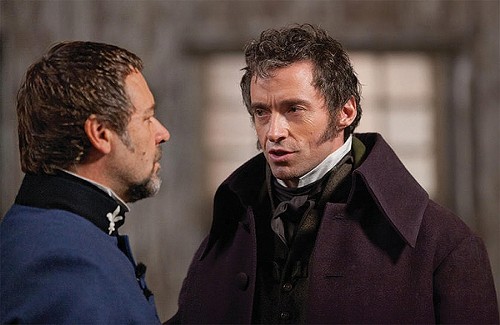Maybe it’s not necessary for me to lay out my Les Misérables bona fides. Maybe it doesn’t matter that I adore the Schönberg/Boublil musical adaptation of Victor Hugo’s novel, that I’ve seen multiple touring and regional theater productions, that I’ve owned the original Broadway cast recording, that I’ve wept to “A Little Fall of Rain” more times than I can count. Maybe that shouldn’t imbue my perspective with any more credibility than that of a newbie. But I’m pretty sure this is a stage production that’s almost impossible to turn into a movie with the same power. And I’m damned sure that if there were a way to accomplish that task, this isn’t it.
That much is clear almost from director Tom Hooper’s (The King’s Speech) opening shot, which sweeps down from the sky into the French shipyards circa 1815 where Jean Valjean (Hugh Jackman) is working off his 19-year sentence for stealing a loaf of bread, under the watchful eye of the relentless Inspector Javert (Russell Crowe). “This is going to be a movie, not some stage-bound adaptation of a play,” Hooper all but lays out in onscreen captions—and in so doing, he shows he doesn’t really understand Les Mis at all.
Because Les Mis, fundamentally, is opera: emotions writ large, combined with stagecraft, meant to be absorbed while taking in the entirety of the scene. And there are moments when Hooper shows he understands how to bring this emotion to the surface. It’s there when Anne Hathaway—as Fantine, the young single mother who turns to prostitution to support her child, Cosette, who will eventually become Valjean’s adopted daughter—tears into her show-stopping aria “I Dreamed a Dream,” a single-take performance that’s riveting in its focused intensity. And it’s present in a similar single-take song, the young soldier Marius’ (Eddie Redmayne) lament for fallen friends “Empty Chairs at Empty Tables.” While the approach may be obvious—just let the singer and the song hold the screen—it’s powerful nonetheless.
But there’s no similar way to handle scenes in which a single voice isn’t the center of attention. “A Heart Full of Love”—the crucial showcase in the romantic triangle between Marius, Cosette (Amanda Seyfried) and the girl who loves Marius unrequitedly, Éponine (Samantha Barks)—never once places all three performers in the same shot, turning the song into a series of close-up snippets with no sense of the connections that will change their fate. The same is true for all the big choral numbers, like “At the End of the Day” and the first-act finale “One Day More,” which lose a sense of scope through piecemeal editing.
A different problem plagues the casting of Crowe as Javert, whose decades-long pursuit of Valjean, and his insistence that a criminal cannot be rehabilitated, provide the story’s central conflict. It’s not, however, the problem that will be most often expressed—that his voice, despite being the frontman for a band, isn’t up to the task. While he’s certainly not the baritone belter most commonly associated with the role, it’s more damaging that Crowe doesn’t seem to understand how to act musical theater of this kind. He’s Method-acting Javert to death in virtually every scene, attempting to convey with simmering, steely-eyed intensity what needs to be conveyed through the sheer force of commanding a stage. Jackman, a seasoned musical-theater stage performer, gets it; Crowe does what he can, never having exercised the operatic muscles he’s called on to use.
Yet even when Les Misérables plays to the balcony—as Sacha Baron Cohen and Helena Bonham Carter do as the comic-relief Thenardiers—it still often feels stunted and ineffective, a story out of its element. Those familiar with the stage production will recall the trademark massive turntable, and the barricade constructed in the streets of Paris by the young protesters, including Marius and his friends. There’s simply no way to duplicate that kind of impressive spectacle in cinematic form, not when you can simply cut to the next scene, and the next song. At the end of the day, Hooper doesn’t realize that live singing on a movie set isn’t enough to recreate the majestic Les Misérables experience—not when so many of the people involved insist on turning it into … well, a movie.
LES MISÉRABLES
Hugh Jackman, Russell Crowe, Anne Hathaway
Rated PG-13
Speaking of ,
-
Walk of Shame, The Lego Movie
New DVD/VOD Tuesday, June 17
- Jun 16, 2014
-
Drinking-Class Zero
Following a night of drinking, Wendy Simpson, 25, walked to a McDonald’s restaurant in West Yorkshire, England, where she was told that the counter was closed and only the drive-through was open but that she couldn’t be served
- Jun 16, 2014
-
How to Train Your Dragon 2
Dragon 2 shows DreamWorks is still willing to be daring
- Jun 13, 2014
- More »
More by Scott Renshaw
-
Film Reviews: New Releases for April 12
Civil War, Escape from Germany, Coup de Chance, Hundreds of Beavers, La Chimera, Sting
- Apr 11, 2024
-
University of Utah School of Music premiere of A.L.I.C.E.
Composer connects the Lewis Carroll story to her experience living with autism
- Apr 10, 2024
-
Beavers and Spiders and Thieves, Oh My
Three new films cover a wide range of styles.
- Apr 10, 2024
- More »
Latest in Film Reviews
Readers also liked…
-
Power Plays
Two satirical comedies explore manipulations and self-delusions by those with power.
- Aug 31, 2022





